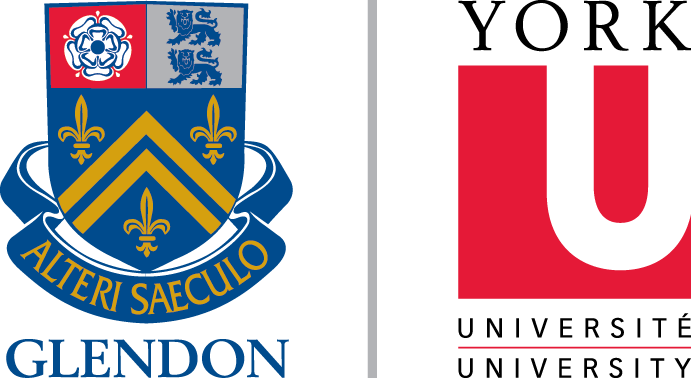Graham Fraser, Commissioner of Official Languages
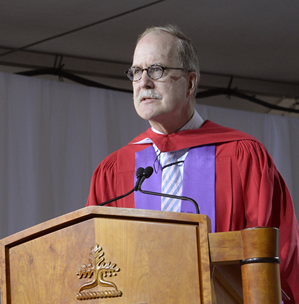
In his thank you address to York University and Glendon College for the honorary degree he had just received on June 21, 2014, the Commissioner of Official Languages of Canada was quick to tell Glendon’s new graduates that mastering two or more languages is a true leadership skill. He advised them to keep in close touch with the friends they have made at university and to vigilantly maintain the second language they have learned or improved at Glendon. “Your mastery of two languages will bring you opportunities, and it is on these that you should focus,” he said. “You should also understand that, as graduates, bilingualism is an important component of your leadership in the society in which you are engaged.”
With these words, Fraser followed in the traditional footsteps of honorary doctorate recipients who do not leave the university campus without first offering some advice to new graduates. He felt particularly privileged to receive an honorary degree from Glendon because of the College’s longstanding commitment to linguistic duality and bilingualism. According to the Commissioner, “Glendon College has been a pioneer in the field of postsecondary immersion. Fifty years ago, it innovated and provided an example that is just beginning to be imitated.”
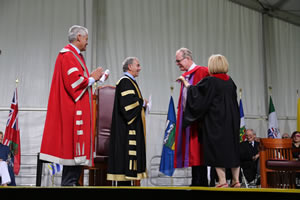
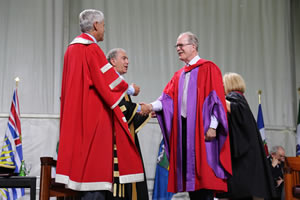
Fraser’s address, delivered in both English and French, also provided an opportunity for him to pay a heartfelt tribute to Ken McRoberts, who was attending his final opening ceremony in his capacity as Principal of Glendon College. “To quote Alyson King, Glendon’s founder, Escott Reid, was ‘resolute and passionate in his quest to find a guiding vision to make the College a fully bilingual institution, a liberal arts college.’ The same thing can be said of Ken McRoberts. From the beginning of his tenure as Principal, he did everything in his power to revive the vision initiated by Reid. And who was better able to do this than Ken McRoberts’,” he asked. Greeting the new Principal, Donald Ipperciel, the Commissioner referred to Ipperciel’s experience as a student at the University of Alberta, specifically at the Campus Saint-Jean, which plays a vital role for the Franco-Albertan community. Such experience will be a tremendous asset to him in his new duties.
Advice to New Graduates
Speaking directly to the new Glendon graduates, Fraser candidly admitted that he felt somewhat torn. He told them: “I’m not sure I understand the challenges of your generation well enough to give you any helpful advice. And it seems to me that the very last thing you could possibly be interested in on a day like today is the unsolicited advice of someone you don’t even know.”
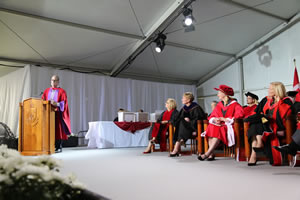
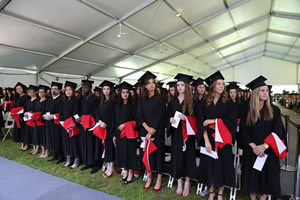
Overcoming his hesitation, the Commissioner of Official Languages then came to the heart of his address. He mentioned his father, journalist Blair Fraser, who stated in a speech nearly 60 years ago that it was a “national disgrace” that, in this supposedly bilingual country, so few of us could speak more than one of Canada’s two official languages, and that the great majority of the small number of people capable of speaking both languages had French as their mother tongue.
Fortunately, this harsh criticism “does not apply to you [Glendon students] and you must be proud of that. Moreover, Glendon College was founded as a reaction to this type of criticism, and it is to York University’s credit that this tradition is continuing,” he added. Fraser went on to say that it would be dangerous to rest on our laurels. “I want to urge you to maintain the second language that you have learned or improved at Glendon, because it’s harder than it looks.”
In Fraser’s view, speaking and understanding a language is not just an intellectual skill; it is also a physical one. A person who stops using a language will eventually lose it and will be in the same boat as an athlete who stops practising. So, in order to learn ‘ and especially to keep ‘ a second language, it is necessary to be seriously and voluntarily committed and personally disciplined, just as commitment and discipline are required to maintain good physical condition.
He added that the rewards for making such efforts are amazing, saying: “I’m not talking here about monetary rewards, even though these rewards do exist. Bilingual people earn more than unilingual, as is well known. Nor do I want to talk about the research carried out by Ellen Bialystok showing that bilingualism slows the onset of Alzheimer’s disease. No, I’m talking about the excitement and the sense of discovery that come from exploring another culture.”
Fraser explained that learning a second language is a deeply stimulating experience that gives rise to a new awareness. “If you have learned English or French as a second language, you have access to cultural, social and political associations that are different and dynamic. The very process of learning your second or third language will expand your horizons, improve your social and interpersonal skills and give you a new perspective on society and people,” he added. Fraser feels that, in learning French, he not only learned about his country, but also developed a new sensitivity to immigration and cultural diversity.
Leadership
Fraser confided to the audience that, in his role as Commissioner of Official Languages, he had learned that mastering a language is an indispensable leadership skill. In his view, it is difficult to manage employees, serve customers, train a hockey team or deal with the public unless we speak the language of the people with whom we are interacting. In many Canadian workplaces, as in the world at large, it is increasingly important to speak more than one language in order to succeed in business and in society. He reminded Glendon graduates that they are in a privileged position to promote the use of both official languages in the business community, as well as in other contexts.
In concluding his acceptance speech, the Commissioner told the new graduates: “You are standing on the brink of a new phase of life. I hope that it will be as full of learning opportunities as these past four years have been. Be aware that, throughout your lives and your careers, your failures will be as important and as valuable as your successes.”
By Michel Héroux
![]()


